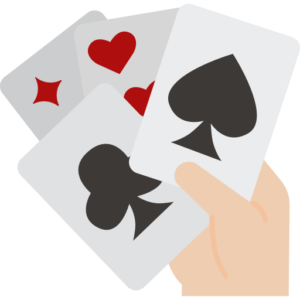Glossary Term
Muck
Muck
Used In: Poker
Introduction
In poker, “muck” refers to the act of discarding or folding a hand without showing the cards to other players. This term is commonly used to describe the pile of cards that players have folded during a hand, which are no longer in play. Once cards are mucked, they are effectively out of the game and can’t be used again for that hand.
Mucking is a standard part of poker and can occur at any stage of a hand, especially when a player decides that their cards are unlikely to win. In most cases, players muck their hands to protect their strategy or avoid revealing information about their playstyle. While mucking is common, some players may accidentally muck their cards, which can lead to confusion or disputes.
The decision to muck is often a strategic one. It helps maintain the mystery of a player's hand and prevents others from gaining insight into their tactics. However, it’s important for players to understand the rules surrounding mucking, as some poker variants require a player to show their hand in certain situations.
Key Points:
- Muck refers to folding or discarding cards without revealing them.
- Mucking helps keep a player's strategy hidden from opponents.
- In some cases, players may accidentally muck their hand, leading to potential disputes.
In Depth Look
It refers to the process of discarding cards that are no longer in play, often without revealing them to other players. When a player folds, their cards are typically placed face down into the muck pile, ensuring that they cannot be reused in the current hand. This helps keep the game moving smoothly and prevents any confusion about which cards are still in play. The muck itself is a physical collection of discarded cards that builds throughout the hand and often includes both folded hands and community cards that are no longer being considered.
Mucking isn’t just a technical aspect of poker; it also plays a strategic role in the game. By mucking a hand, players avoid giving away any information that could potentially be used by their opponents. Revealing a folded hand can sometimes give insight into a player’s tendencies, such as their betting patterns or what kinds of hands they are willing to play. For example, if a player consistently folds strong hands without showing them, others may catch on to this behavior and adjust their own strategies accordingly. Mucking helps to maintain the element of surprise and prevents others from gaining an unfair advantage based on prior information.
While mucking is generally a routine part of poker, it can also lead to complications if not handled properly. In some cases, players may accidentally muck their cards, leading to confusion or disputes. For instance, in games where players are allowed to see mucked hands under certain conditions, an accidental muck can mean missing the opportunity to show a winning hand or could even result in a player losing out on potential winnings. It’s important for players to be cautious when mucking and to follow the house rules regarding the visibility and handling of mucked cards. Understanding the subtleties of mucking is essential for both casual players and those aiming to improve their game.
Mechanics
A key thing to remember is that when a player decides to fold their hand, they place their cards face down into the muck pile. This action is typically done without revealing the cards to the other players, ensuring that no one knows what the player was holding. In most cases, the dealer is responsible for gathering the mucked cards and placing them in the designated area of the table. Once in the muck, the cards are considered out of play and cannot be retrieved or used again for that hand.
In some poker variants, the mucking process can have additional rules or nuances. For example, in games like Texas Hold’em, players may be required to show their folded cards in certain situations, such as if they are involved in a showdown or if a player wants to dispute a hand. In these cases, players must be mindful of when and how they muck their cards to avoid any confusion. Additionally, some poker games may allow players to “reveal” their mucked cards under specific circumstances, adding a layer of strategy regarding when to show or hide one's hand. Understanding these mechanics is key to playing poker efficiently and avoiding any potential issues during the game.


Illustrated Example
let's say two players are involved in a hand, Player A and Player B, and both are playing Texas Hold'em. Player A has a pair of Jacks, while Player B has a King and 10 suited. The community cards show a 9 of Spades, 7 of Hearts, 2 of Diamonds, 3 of Clubs, and Queen of Hearts. After the river card is dealt, Player A sees that their hand of Jacks is unlikely to win against Player B's possible straight (King, 10, and the Queen on the board). Therefore, Player A decides to fold and muck their cards. Player B, however, is confident in their straight, so they choose to stay in the hand and win the pot.
At this point, Player A’s cards are placed face down into the muck, as shown in the table below. Player B reveals their cards at the showdown and wins. The mucked cards of Player A are not revealed to anyone, keeping their strategy hidden. Here’s how the table would look after Player A mucks:
| Player | Hand | Action | Cards Mucked? |
|---|---|---|---|
| Player A | J♠ J♦ | Fold | Yes |
| Player B | K♥ 10♥ | Stay | No |
| Community Cards | 9♠ 7♥ 2♦ 3♣ Q♥ | ||
Player Perspective
From a player’s perspective, mucking is a key part of managing the game’s flow and maintaining strategic advantage. When deciding to fold, players often choose to muck their cards as a way to keep their hand’s strength hidden from others. By doing so, they avoid giving away any insight into the type of hands they play or the tendencies they exhibit in certain situations. This is especially important for more experienced players who use this tactic to prevent opponents from adjusting their strategies based on what was folded. Mucking also allows players to avoid showing signs of weakness or strength, which might influence how others perceive their playstyle.
In some cases, mucking can also be used to protect oneself from unnecessary scrutiny. If a player knows they are going to fold a weak hand, they might muck it to avoid any judgment or second-guessing from others at the table. On the flip side, if a player feels they made a mistake by folding too early, mucking their cards ensures they don't have to reveal that mistake, preserving their confidence and reputation at the table. Ultimately, mucking is about controlling the flow of information and keeping a poker face—figuratively and literally—so players can maintain their edge over the competition.
Conclusion
Mucking in poker is more than just a routine action; it's a tool that shapes the game's strategy and flow. By discarding cards without revealing them, players maintain an essential element of secrecy, which is crucial in a game built on deception and misdirection. Whether it's to protect a weak hand, conceal a clever fold, or prevent opponents from gaining insight into one's playstyle, mucking helps players control the narrative at the table. In the end, mucking is a simple yet powerful mechanic that serves to keep the game fair, unpredictable, and as strategic as possible.
The Top Online Casinos for Playing Poker
These platforms prioritize player satisfaction by providing intuitive interfaces, seamless gameplay experiences, and robust security measures to ensure a fair and enjoyable environment for all users.
No results were found!


Author
Branimir Ivanov | Senior News Contributor








